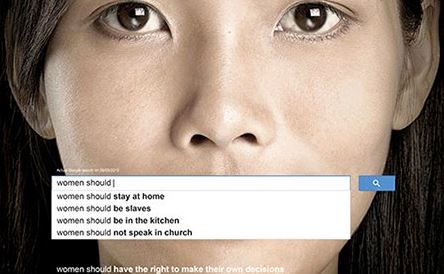Published: 11 December 2013
Region: Worldwide
 “Women should stay at home.” “Women shouldn’t have rights.” “Women cannot drive”. These are the results you get when you type “women should/shouldn’t/ cannot” in Google Search bar and let the browser to finish the sentence for you.
“Women should stay at home.” “Women shouldn’t have rights.” “Women cannot drive”. These are the results you get when you type “women should/shouldn’t/ cannot” in Google Search bar and let the browser to finish the sentence for you.

This search was the base for the last campaign of UN Women that highlights the discrimination found in Google Search.
The campaign portrays four women from different cultures who have Google search bars over their mouths with two words typed “women should/shouldn’t/have/ need/cannot” and followed by autocomplete algorithms that ended the sentences with negative sentiments ranging from stereotyping as well as outright denial of women’s rights. Some of the examples are ‘women should be in the kitchen’, “women shouldn’t vote” or “women need to be put in their place”.
The UN campaign went viral and hundreds of blogs, news sites and social media shared it. The print campaign was followed by a video showing gains and challenges for women’s equalities. But critics also rose, questioning the validity of the search and how autocomplete algorithms act.
Google search use autocomplete algorithms which finish your sentences when you type a few words. These algorithms are based upon the most common terms search by other people and the country where you are located.
One of the critics that an article at Business Insider pointed was that The Memac Ogilvy & Mather Dubai who developed the campaign, conducted the searches from Dubai, the United Arab Emirates, where women struggle to be treated equally and where is more likely to find gender discrimination.
For example, the first sentence that comes from Google Search in Iceland, which is the best country for gender equality according to The Global Gender Gap Report 3013, is ‘women should rule the world’ but also ‘women shouldn’t vote’.
It was also criticised that the autocomplete system “might make people decide to search for things that they didn’t have the intention to as it intervenes before people have completed formulating their thoughts in writing”.
For UN Women, the searches confirm the urgent need to continue making the case for women’s rights, empowerment and equality. The team that created the campaign says in an interview for Adweek that “we hope our work will help raise awareness of the sexist global attitudes toward women and will enable a dialogue to begin on the topic”.